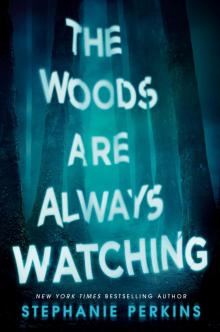- Home
- Stephanie Perkins
The Woods Are Always Watching Page 2
The Woods Are Always Watching Read online
Page 2
“Sorry I can’t help you anymore,” Neena said, shuffling toward her.
Josie startled. “What?”
“With your pack. We should have moved yours, too, before I put on mine.”
Sometimes Josie believed, sincerely, that Neena could read her mind. She was glad this wasn’t one of the occasions. Putting on a show of false enthusiasm and roaring with exaggerated strength, Josie hefted her pack to the edge of the hatch.
Neena blinked at her. Mystified. “How’d you do that?”
“You’ve got the food. I’ve got the tent. The food weighs more.”
“Fuck that. You’re taking the food tomorrow.”
Josie grinned, for real. “After we’ve already eaten some? No problem.”
“You devious, devious wench.”
“That was the deal. You got the lady backpack, so you got the extra pounds.” Josie shoved her pack into an upright position. It took several attempts before it stayed.
“I got the lady backpack because I’m shorter than you. And I still think the lady backpack should necessitate fewer pounds.”
“The lady backpack distributes the weight more evenly across the lady’s body.”
Neena waddled in a circle. Her hands were posed like she was modeling. “Now, tell me. Is it this luscious shade of purple that makes it a lady backpack?”
“Luscious lavender.”
“Ladies in Lavender . . . wasn’t that a movie with Judi Dench?”
“And Maggie Smith. They nurse a sexy, young violinist back to health.”
“When we’re old,” Neena said, “I want us to be surrounded by sexy, young violinists.”
“I’d settle for us just being Dames,” Josie said. Her pack was navy blue and stained from years of rugged use. Win had started solo backpacking after their father’s death. Their father had loved the outdoors, and, in his grief, her brother had found refuge there. He’d been seventeen then, only a few months younger than Josie was now. It was a surprising realization. Now Win was twenty-two, but it seemed like he’d been an adult forever.
Meegan, owner of the lavender pack, had only taken up backpacking when she and Win started dating. Josie hoped she would never stoop to something like that. But if a guy ever showed any interest in her, maybe she’d take up a dumb hobby to impress him, too.
“Obviously we’ll be Dames,” Neena said.
Josie loved talking with Neena like this. Like their future was certain. Like they would always be friends. She backed up neatly into her upright pack, slipped the straps over her shoulders, snapped it all together, and stood.
“Aw,” Neena said. “That’s not fair.”
Compared to Neena, Josie was tall. Practically brawny. She had the type of body that could have real, natural strength if she put forth even a modicum of effort. But she never had, so it didn’t. The burden on her back—the sheer resistance to her effort—was staggering. She balked. “Oh my God. People do this for fun?”
“That’s what I said!”
Panic flooded through Josie. It hadn’t occurred to her that they might not be physically capable of this trip. “How are we supposed to carry these for three days?”
Neena shook her head. “I have no idea.”
“How?”
“I don’t know,” Neena said. But the joking had stopped. Whenever one of them freaked out—and, admittedly, it was usually Josie—the other went calm. “We just will.”
Josie was sure that if Neena could have shrugged right now, she would have shrugged. Not condescendingly. The gesture would have been comforting. Josie’s panic dulled back into an uneasy, unidentifiable dread. “Right. People do this all the time.”
“Yeah. And we’re people,” Neena said. “Surely we can do this, too.”
“Did you see us in gym class?”
Neena slammed the hatch closed. Birds squawked and took to the humid air. “I kept my eyes closed in gym class.”
“That explains a lot.”
After double-checking that they had everything, Josie stuffed the car keys into the top of Neena’s pack.
“Oh, jeez,” Neena said. “Don’t look.”
Moving to investigate, Josie whacked Neena with her pack. “What?”
Neena oofed.
“Sorry. What? I don’t see any— Oh.”
“I told you not to look.”
A plywood notice board stood beside the trail. In large type on a sheet of copy paper protected by plastic, a faded sign read: BEAR CANISTERS REQUIRED.
“It’s okay,” Neena said. “We’ve got one.”
A second notice with smaller type was tacked beside it, and Josie toddled over to read it. The unwelcome words raked across her skin so viciously that she felt marked. “It says if we don’t have a canister we can get fined. Or even get jail time.”
“Again. We have a canister.”
“It’s from the Forest Service. ‘Emergency requirement to use bear-resistant canisters in . . .’ And great. It lists Frazier Mountain, Deep Fork, Misty Rock Wilderness, and Burnt Balsam Knob. That’s our whole itinerary.”
Neena sidled up to her and pointed. “What are those?” Several different sets of handwriting were scrawled directly onto the splintered plywood.
5/20 bear walked through Misty Rock campsite at 9:40 PM
6/2 Meadow Ridge Cove 2x bears
6-9 saw one bear cross Misty Rock Creek
6/17 meadow ridge cove 1 bear 6 pm
6/29 one bear in Misty Rock Wilderness
7-7 Burnt Balsam 2 bears
Josie’s head wrenched away, trying to avoid absorbing the information. Primal anxiety swelled within. In her mind, a lumbering beast snuffled outside their flimsy tent. The hackles of its shadow rose. A ferocious claw slashed through the defenseless nylon, attacking with frenzied black eyes and snarling white teeth.
“No activity since July,” Neena said. “See? They’re already hibernating.”
“We’re so getting Revenant-ed.”
“That was a movie.”
“Based on a true story!”
“Okay, but it happened, like, two hundred years ago in Canada or Alaska or whatever. And he was attacked by a grizzly bear. No one gets hurt by black bears.”
Actually, in this decade alone, ten people had been killed by black bears in North America. Josie had looked it up. None of them had been on this part of the continent, but still. In recent years, black bear traffic had increased significantly throughout Asheville. Heavy rains due to climate change meant it took longer for nuts and berries to ripen, which meant that bears were emerging from the woods in search of other food. Trash cans were gashed with claw marks. People were hospitalized after accidentally interrupting feasts. And then there was the man who had weaponized his own mountain bike to fend off an aggressive mama bear. That had happened here, inside this very forest. Where there were no cars or houses or buildings to provide protective shelter.
“Oh, shit.” Neena punched Josie’s arm. “Smokey Bear. How did we forget him? He’s a park ranger. He saves lives. Think of them as helpful Smokeys.”
But Josie didn’t want to think about bears at all. She desperately wanted to stop thinking about them. She couldn’t admit, not even to Neena, that The Wizard of Oz had frightened her as a child—not because of the Wicked Witch or her squadron of flying monkeys, but when Dorothy and her friends had chanted, “Lions and tigers and bears! Oh my!” as they’d skipped into the dark wood, they had introduced Josie to the concept of being eaten alive. Flesh ripping. Teeth gnashing. Watching your own meaty chunks be swallowed down the throat of another carnivorous mammal.
Lions . . .
Black panthers had long been part of state folklore, but they were as likely to be discovered as Bigfoot. Bobcats did live here, though they only attacked humans if they were sick or rabid. However, once upon a time, mount
ain lions had also lived here—and some believed they still did. Sightings of long-tailed cats with tawny-colored fur remained rampant among hunters, though experts claimed if they did exist, they were simply exotic pets that had been released. This didn’t make Josie feel any better. A pet mountain lion was still a mountain lion.
. . . and tigers . . .
At least there weren’t any tigers. Although Josie had once read that there were more tigers in captivity in the United States than in the wilds of Asia, a fact that distressed her on multiple counts.
. . . and bears!
But bears. There were definitely bears out here. Oh my.
Josie shifted to her mental checklist: Keep the campsite clean. Make noise. Place everything that smells out of reach. Watch out for scat and tracks and rubbed tree bark. Urinate far away from the tent. Her palms were clammy. She didn’t want to do this. Why were they doing this?
“Where’s your phone?” Neena asked. “We need to commemorate the moment.” She nodded toward the other sign, the one beside the notice board. It was large and proud and distinctly American with its National Forest typeface and specific shade of brown.
WADE HARTE TRAILHEAD, it said. PISGAH NATIONAL FOREST.
Josie tugged the phone out from her jeans—her hip belt didn’t have a handy pocket like Neena’s—and they took dozens of selfies in front of the sign, hoping that at least one would make them look good. Giant smiles. Sunglasses on, sunglasses off. The screen blurred because Josie’s glasses were prescription. To conserve the battery, she switched the phone to airplane mode, and then Neena stowed it in the top of Josie’s pack so that it wouldn’t dig into her thigh. It barely fit. Josie wondered if the weight would lighten as they consumed the food or if it would grow heavier with their exhaustion.
“Nothing to it but to do it,” Neena said, quoting their least-favorite teacher because they liked reminding each other how awful he was.
“Keep calm and carry on,” Josie said as they set off down the trail.
“Too blessed to be stressed.”
“Oh God. Why do they all have to rhyme?”
Their banter continued as they rounded the first bend. Josie glanced back. The burbling river softened and then silenced. Neena’s car disappeared.
The woods swallowed them whole.
ROBUST EVERGREENS TOWERED overhead and deciduous hardwoods preened, dappling the midday light. Rhododendrons spiraled with leathery leaves. Wildflowers dipped their heads in greeting. Those, smooth and red. These, frilly and white. A weedy vine tangled to form a wall of electric-orange blooms. It was a dramatic contrast from the tired vegetation that had edged the parking lot, yellowed by car exhaust and human presence. The inner forest was lush and vigorously alive. Even the air smelled better here, pristine with fresh oxygen and perfumed by rainy loam.
Neena would have been awed . . . if only her backpack wasn’t trying to murder her.
The Wade Harte Trail had been challenging from the start. It began with a climb and then continued to a steeper climb. The ascent was unrelenting. Roots, rocks, and downed trees were scattered everywhere across the path, treacherous obstacles lying in wait to roll their ankles. It was exactly what Neena had expected but also somehow worse. Hunching and huffing beneath her pack, its straps dug nastily into her shoulders. No amount of adjusting them or cinching the belt helped. Her limbs dragged with unparalleled fatigue. They had been walking for eight minutes.
“Fuuuuuuuuuck,” Neena said, for the fifth time.
“At least we’re only doing half the trail. Can you imagine?”
“Who is Wade Harte, anyway?”
“No idea, but I read somewhere”—though neither girl had much life experience, they’d always read something, somewhere—“that hikers call this a mini-AT.”
“A mini-what?”
“Appalachian Trail.” Josie pronounced it correctly, like a Southerner. Latch-un, not lay-shun.
“Oh. Doesn’t that run nearby? Or am I thinking of the Mountains-to-Sea Trail?”
“Both, I think.”
Neena bragged. “Look at us, knowing stuff about hiking.”
“We’re hiking geniuses.”
The girls were traipsing up Frazier Mountain, the tallest of several mountains that crested six thousand feet in these woods, but they weren’t hiking to its peak. Thank God. They planned to ascend two-thirds of the way up the mountain before descending into a clearing called Deep Fork, where they would set up camp and spend the night. Measured from the parking lot, the elevation gain was over two thousand feet.
Due to the ascent, today’s hike would be more physically challenging, but tomorrow’s mileage would be more than double. In the morning, they would head into the Misty Rock Wilderness, which sounded like a location on a Tolkien map, and then eat lunch at Burnt Balsam Knob, which sounded like a penis that had been caught in a forest fire. After that, they’d turn around and come back, looping onto a different trail for scenic variation. Tomorrow night, they’d sleep somewhere back in the Misty Rock Wilderness before returning to the trailhead on Wednesday afternoon.
Round trip, the journey was nearly twenty miles. A through-hike on the Wade Harte was just over thirty—stretching from Frazier Mountain in the north to the town of Brevard in the south—but Neena and Josie had wanted this trip to be theirs, completely. They didn’t want another person dropping them off at one end and picking them up at the other.
The trail would eventually cross through a protected wilderness area where signs and trail markers weren’t allowed, but, so far, the path had been well-worn and easy to follow. Neena prided herself on a strong internal compass. Her parents, however, had also made them pack an actual compass, a printed trail map, and further printouts about the trail sections and water sources.
But mainly they were relying on technology. Their phones already had compass apps, and GPS was even easier.
Neena wobbled over another supine tree decomposing across the trail. Behind her, Josie’s footsteps halted. “Did you look?” Josie asked.
“At what?”
“You should always look before stepping over a log. In case of snakes.”
Neena shuffled around to face her, wielding a deadly stare.
“I know.” Josie blushed as she peered over the log. “But seriously, timber rattlesnakes and copperheads. You need to be careful.”
Neena wondered if their entire trip would be peppered with these lists of lethal fauna. She changed the subject to something far more pressing. “I need to pee.”
Josie’s response was exuberant. “Yes! I’m dying, but I was afraid to say something. I mean, if it weren’t for the trees, we’d still be able to see your car.”
The girls had “pre-hydrated”—they despised this word, cudgeled into the English language by coaches and jocks—by consuming a liter of water each on the road. Supposedly, this would give them a head start on fluid loss. Win had advised them to drink slowly, because chugging would make the liquid pass faster, but that didn’t seem to have mattered. Their bladders were already bursting.
Neena unsnapped the sternum strap and hip belt, slid out, and gasped as the pack almost ripped her arms from their sockets. The pack thudded straight to the ground. She teetered with the drastic shift in her center of gravity.
Josie made a similar gasp and teeter.
“Okay,” Neena said, massaging her shoulders. “We’ll find a better way to do that.” But the freedom was rapturous. They were like a sagging mule team lugging supplies into the Grand Canyon. Two liters of water per day, per person, was required, so they’d secured one-liter bottles to both sides of each pack, which they planned to refill along the way. Only luck had kept the bottles from cracking in the fall.
“Do you need the shovel?” Josie asked.
“Thankfully”—Neena shuddered—“not yet.” Win had been remarkably unperturbed as he’d given them the ins
tructions about defecating in the woods.
“Toilet paper or are you gonna air-dry?”
“We have to bury it if we use it, right?”
Josie scratched behind an ear. “Probably?”
They decided to air-dry.
Neena climbed uphill, off the path, and ducked behind a boulder—but not before first checking for venomous snakes. Damn you, Josie. Positioning herself so that the stream would travel downhill, Neena tugged her jeans and underwear down to her knees.
The forest canopy swayed overhead. The wind chilled her exposed flesh.
Josie piped up from behind a nearby conifer. “I read that this land used to be part of the Biltmore Estate, and the Vanderbilts were the ones who sold it to the Forest Service.” The Biltmore was the largest privately owned house in the United States, and, at the time of its construction, the Vanderbilts were the country’s wealthiest family thanks to the fortune they’d made in shipping and railroads. Now their house was Asheville’s main tourist attraction. It looked like the Downton Abbey house on steroids. “Apparently, Pisgah was one of the first national forests in the east.”
“How was this even theirs to sell? Surely, it belonged to the Cherokees.” Neena’s parents were Indian, but strangers often mistook this for American Indian, which, around here, meant Cherokee. Unless they presumed her family was Mexican. Which also happened to a ludicrous degree.
“Surely.”
“What does ‘Pisgah’ even mean? It sounds so ugly. I used to think it was Pig-sah.”
“I did, too,” Josie said. “I think it’s biblical.”
Neena’s squat was careful. Her legs trembled. Nature finally overtook performance anxiety, and she sighed with relief as the trickle turned into a gush. But when she waved her hips to shake off, a watery red droplet splashed onto her thigh. “Shit,” she whispered.

 Summer Days and Summer Nights: Twelve Love Stories
Summer Days and Summer Nights: Twelve Love Stories Anna and the French Kiss
Anna and the French Kiss Lola and the Boy Next Door
Lola and the Boy Next Door There's Someone Inside Your House
There's Someone Inside Your House Isla and the Happily Ever After
Isla and the Happily Ever After The Woods Are Always Watching
The Woods Are Always Watching Summer Days and Summer Nights
Summer Days and Summer Nights